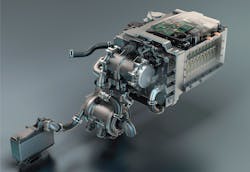GM to Supply Hydrogen-Fuel Cells for Nikola Trucks
General Motors Co. entered into a “memorandum of understanding” with zero-emission truck developer Nikola Corporation, concerning a global supply of GM’s Hydrotec fuel-cell system for Nikola’s Class 7/8 semi-trucks.
According to Doug Parks, GM executive vice president of Global Product Development: “Providing our Hydrotec fuel cell systems to the heavy-duty class of commercial vehicles is an important part of our growth strategy and reinforces our commitment toward an all-electric, zero-emissions future.”
If the agreement is enacted, GM would engineer its Hydrotec fuel cell system to the specifications mutually agreed upon by both companies. The two manufacturers will discuss the scope of services that GM would provide for integrating the fuel cell system into Nikola’s vehicles.
The Hydrotec system will be engineered by GM at its Pontiac and Warren, Mich., technical centers and manufactured at the Brownstown Charter Township (Mich.) battery assembly plant.
Vehicle production is expected to start in late 2022.
In September, GM took an 11% stake in Nikola, and agreed to engineer and build the Nikola Badger electric truck. as well as its batteries. That agreement is apparently revised and replaced by the new MoU.
Also at that time, Nikola agreed to use GM’s Hydrotec hydrogen-fuel cell and Ultium electric-vehicle battery technologies.
In the new agreement, the two also agreed to discuss a supply of the Ultium battery system for Nikola’s Class 7/8 trucks.
“Heavy trucks remain our core business and we are 100% focused on hitting our development milestones to bring clean hydrogen and battery-electric commercial trucks to market,” according to Nikola CEO Mark Russell. “We believe fuel-cells will become increasingly important to the semi-truck market, as they are more efficient than gas or diesel and are lightweight compared to batteries for long hauls. By working with GM, we are reinforcing our companies’ shared commitment to a zero-emission future.”
